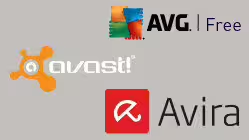Antivirus
It is vital that you use some form of antivirus program if you surf on the internet.
There are free services available, and often these are as good, if not better than the paid for services.
A firewall is advisable, but if you are connecting behind a router (which will offer some protection) then you might be OK with a good all round antivirus/protection system and the Windows firewall.
The 3 main free programs are
I have used them all and in the past AVG was a very good choice, as it was a compact program with small manageable updates, particularly useful if you are on a modem.
I still use it on some of our machines, but have started to use AVAST as it offers a good service with a reasonable level of load on the computer. I particularly like the SANDBOX feature, which is a computing term for a program that creates a temporary ‘Sandbox’ for newly introduced programs to be trialed but without the ability to make changes (which could be malevolent) to your PC. If you are happy with the program you can load it fully.
AVIRA is of a similar standard to AVAST, but does have a habit of nagging to upgrade to the paid for service.
Choosing the right Browser
Firefox has been my browser of choice for many years. It’s mix of innovation (first to have tabs), high level of security and amazing range of plugins to provide extra facilities makes it a very good browser. Recently, it has started to become much bigger and resource hungry, but if you have a relatively new machine, this should not be a major issue.
I only use Internet Explorer if I have to – perhaps the site is Microsoft or one configured only for IE, and fortunately there are very fewof these now. I think that the later versions (post IE7) have started to improve considerably and are often the browser of choice for many people.
Chrome from Google is the new kid on the block. Originally independent, it has been developed by Google and is rapidly gaining share of the browser market. Widely acclaimed as one of the most secure browsers, it uses a ‘Sandbox’ type format with each TAB independent of each other, so making it particularly secure.
The good thing about browsers is that you can load on more than one and try them when you want. Both Firefox and Chrome are worthwhile additions if you already have IE installed.
Control Scripts
Scripts like ‘Javascript’ which is responsible for many of the innovations on web pages, making them more dynamic as they actually ‘run’ on your computer (this site uses Javascript as part of the WordPress system) and ‘Flash’ a software protocol that allows video and graphic imagery to be added with a range of processing features to play games, or manipulate the graphics, which also runs on your computer.
Unfortunately, these features are often used to create malicious programs which are effectively ‘invited’ onto your machine by you and your browser, making them difficult to combat by protection software, until it is too late.
Most browsers enable you to stop both these types of scripts from running, unfortunately they will often stop sites that you want from running too, so it can be a tricky balance. Plus, you need to set it up in preferences which can make it frustrating for sites you know.
I use ‘Noscript’ plugin for Firefox, which effectively stops all scripts on a site when you land on it. It tells you that it has done so and you can change as required. You then have the option to ALLOW scripts on the site (which will allow them permanently – as the site details will be stored for future visits), or TEMPORARILY ALLOW for the duration of your visit. Flash panels are blocked and you have the option to run, if you want. If you are on a site you trust, you simply enable the scripts.
The main downside is that you may have to reload the page after you enable the scripts as they have to restart – particularly for forms and the like – however, you soon get into the habit of checking the scripts on sites you trust, and once done the browser will remember your approval for next time.
Unfortunately, there is no equivalent for Chrome yet. Internet Explorer 8 uses filters, but I believe these are not as comprehensive as NOSCRIPT.
Non-Windows
My summary has been based on Windows browsers. MAC users with Safari seem to be poorly served, security-wise – but Firefox is also available for MAC as well as LINUX – probably the safest option still of the commonly available PC operating systems. The best combination proably being LINUX, with firewall enabled and running Firefox with NOSCRIPT plugin.




